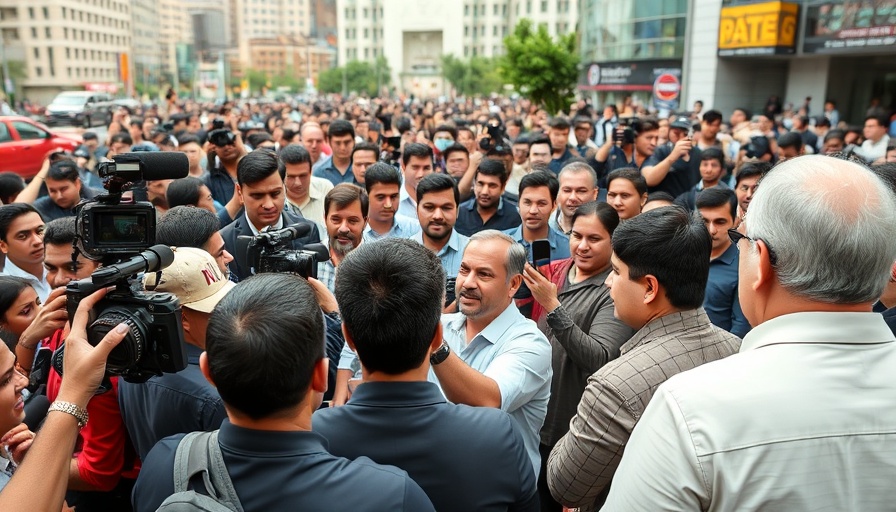
Understanding the Recent Arrest of Palestinian Activist Mahmoud Khalil
In a significant escalation of the Trump administration's crackdown on pro-Palestinian activism, Mahmoud Khalil, a Palestinian activist and Columbia University graduate, was recently arrested by Immigration and Customs Enforcement (ICE). This incident raises serious questions about free speech, immigration, and the future of activism on U.S. campuses.
Background: The Context of Khalil's Activism
Khalil was a prominent figure in the protests against Israel's actions during the Israel-Hamas war, playing a key role in student negotiations at Columbia University. His activism is part of a larger movement among students advocating for Palestinian rights, which gained momentum following the conflict that erupted in October 2023, when Hamas attacked Israel, igniting widespread protests on college campuses across the nation.
The Importance of Student Activism
The groundswell of support for Palestinian causes among students signals a generational shift in how activism is approached on campuses. Khalil's arrest is not an isolated incident; it reflects a broader trend where student activists are increasingly targeted for their political expression. As addressed in various reports, this situation highlights the delicate balance between national security concerns and constitutional protections that guarantee freedom of speech.
Legal and Political Implications
Khalil's detention came without any criminal charges, raising alarm bells among legal experts regarding the implications for immigration law and the rights of permanent residents in the United States. The Trump administration has touted this action as part of a commitment to punish perceived anti-Semitic behavior, but many argue that it serves as a chilling effect on student political expression.
In Defense of Activism
Advocates for civil liberties are vocal about the risks presented by Khalil’s case. Civil rights attorney Camille Mackler criticized the administration's move as retaliatory and detrimental to free speech rights in the academic context. “This has the appearance of a retaliatory action against someone who expressed an opinion the Trump administration didn’t like,” she stated, urging a reevaluation of the legal framework that permits such actions against student activists.
Future Predictions: Activism in a Post-Khalil Landscape
The developments following Khalil's arrest could have lasting implications for student activism and the reception of such movements in academic environments. As the political landscape continues to evolve, student groups may find themselves increasingly scrutinized and targeted, leading to both heightened tensions and opportunities for solidarity among those advocating for Palestinian rights.
The Role of the Judicial System
In a critical turn of events, a federal judge halted Khalil’s deportation proceedings, illustrating the vital role the judiciary plays in safeguarding individual rights against executive overreach. Legal experts emphasize that ongoing judicial scrutiny will be essential in determining how such cases unfold, possibly setting precedents for future activism.
The Perception of Public Officials
Public reaction to Khalil's arrest has been divided. On one side, figures from Trump’s administration have framed the action as necessary to combat anti-Semitism and protect Jewish students on campuses. Conversely, critics argue that this situation reveals a concerning authoritarian trend within U.S. immigration policy.
Emotional and Human Interest Angles
This narrative is also deeply human, touching on Khalil's role as a husband to an American citizen who is expecting their child. The personal stakes involved add a layer of empathy to the legal and political machinations at play. Khalil's situation encapsulates not just a legal battle but also a family’s struggle, highlighting the intersectionality of immigration law and personal lives.
With tensions rising around immigration, national security, and free speech, the story of Mahmoud Khalil serves as a focal point for broader discussions regarding activism in America today. His detention is not merely a legal issue—it is a bellwether for how political dissent may be managed in the years to come.
Join the Conversation
As the ramifications of Khalil's arrest continue to unfold, it is essential for the public to stay informed and engaged. Discussions surrounding free speech, immigration rights, and activism will only grow more complex. Readers are encouraged to follow the developments in this case and other related news to understand the broader implications for society, particularly for the rights of student activists across the country.
 Add Element
Add Element  Add Row
Add Row 



Write A Comment